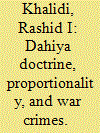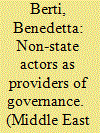|
|
|
Sort Order |
|
|
|
Items / Page
|
|
|
|
|
|
|
| Srl | Item |
| 1 |
ID:
136137


|
|
|
|
|
| Summary/Abstract |
The democratic evaluative tradition has sought to change evaluation practice towards approaches and techniques that generate diverse forms of knowledge and foster public deliberation over a programme's merit and worth. This paper locates one evaluation method, ‘Most Significant Change’ (MSC), within this tradition. Drawing on two different evaluations – one, of a comprehensive economic sector assistance package to the Government of Tokelau, and the other of a psychosocial and academic support intervention for pre-adolescent children in conflict-affected regions of the Gaza Strip – the paper provides evidence of how MSC can capture unexpected outcomes, act as a tool for real-time formative learning, and expose the competing theories, logics and values behind programme activity. The examples within the paper also provide evidence of how MSC begins to redistribute traditional power relationships in assessing the merit and worth of observed impacts by increasing the legitimacy of local programme knowledge, and engaging all parties in evaluative decisions. By doing so, MSC, the paper argues, better serves the purposes of learning, improvement and mutual accountability which should sit at the core of good development practice.
|
|
|
|
|
|
|
|
|
|
|
|
|
|
|
|
| 2 |
ID:
136591


|
|
|
|
|
| Summary/Abstract |
IN JULY 2014, Israel launched its third and most massive military assault in a period of less than six years on the 1.8 million people of the Gaza Strip. In so doing, it killed over twenty-one hundred Palestinians and wounded more than eleven thousand. The vast majority of the thirteen thousand casualties were civilians, and well over half of them were women, children, old people, and the disabled. This latest massacre of the innocents provides the occasion for the Journal of Palestine Studies (JPS) to offer a special dossier centered on Gaza.
|
|
|
|
|
|
|
|
|
|
|
|
|
|
|
|
| 3 |
ID:
134234


|
|
|
|
|
| Summary/Abstract |
On a single day in July, when ambient tensions escalated, Palestinian militants fired more than 180 rockets into Israel, and the Israelis launched airstrikes against towns throughout the Gaza Strip. Dozens of Palestinians, most of them civilians, were killed. The order of daily urban life was disrupted, yet again, by warfare.
|
|
|
|
|
|
|
|
|
|
|
|
|
|
|
|
| 4 |
ID:
136629


|
|
|
|
|
| Summary/Abstract |
The latest war in Gaza—from the beginning of July to the end of August 2014—is over, but both Israelis and Palestinians believe it will not be the last one. Israelis believe they must deter Hamas from conducting additional attacks and keep it weak should a conflict occur. This is an approach that more pro-Western Palestinian leaders and Arab states like Saudi Arabia, fearing the political threat Hamas poses, often quietly applaud. For their part, Hamas leaders remain hostile to Israel and feel politically trapped by the extensive blockade of Gaza—and all the while, Gaza lies in ruins. The combination is explosive. Israeli security analyst Yossi Alpher put it succinctly: “It is increasingly clear that the Gaza war that ended in August will soon produce…another Gaza war.”1 The Economist also gloomily predicted that “war will probably begin all over again, sooner or later.”2
|
|
|
|
|
|
|
|
|
|
|
|
|
|
|
|
| 5 |
ID:
136596


|
|
|
|
|
| Summary/Abstract |
Since the summer 2014 Israeli assault on the Gaza Strip, the calls have grown louder for Palestine to ratify the Rome Statute and join the International Criminal Court (ICC). Palestinian factions across the political spectrum have indicated that they would support such a move. But in spite of gaining the status of an observer-state at the United Nations, Palestine has yet to join the ICC. While acceding to the Rome Statute and filing the application to the ICC is a relatively straightforward process, there are numerous risk factors involved. This article investigates a variety of possible scenarios and their likely outcomes, including the legal mechanisms necessary for acceding to the Rome Statute, and alternative measures that the Palestinian leadership might envisage.
|
|
|
|
|
|
|
|
|
|
|
|
|
|
|
|
| 6 |
ID:
134813


|
|
|
|
|
| Summary/Abstract |
Looking closely at Israel’s obligations over Palestinian natural resources, we can see that Israel, as an occupying power, does not obtain sovereignty over the West Bank, East Jerusalem or the Gaza Strip, and acts as an administrator of the land as long as the occupation continues.
|
|
|
|
|
|
|
|
|
|
|
|
|
|
|
|
| 7 |
ID:
136653


|
|
|
|
|
| Summary/Abstract |
The long conflict between Israel and Palestine took a turn for the worse after the kidnapping and killing of three Israeli teenagers in June 2014. The three teens—Naftali Fraenkel, Gilad Shaer and Eyal Yifrah—disappeared while in the West Bank, leading Israel to conduct a massive manhunt in the Palestinian territory, alleging that they were abducted by members of Hamas (a Sunni Islamist group in Palestine, recognised by many countries as a terrorist organisation).1 On July 2, 2014, a 16-year-old Palestinian named Muhammed Abu Khdeir was found dead in Jerusalem, leading to reports claiming that it was a revenge killing by Jewish extremists for the murders of the three Israeli boys.2 These events led to Israel launching ‘Operation Protective Edge’ in the Gaza Strip, which is primarily controlled by Hamas. Since the beginning of the operation on July 8, according to reports, 5,226 air strikes took place in Gaza and 4,591 rockets and mortars were fired at Israel. According to the Israeli Defence Forces (IDF), it attacked 5,263 targets across the Gaza Strip, hitting terror infrastructure, namely rocket launching sites, arms and munitions factories and warehouses, as well as the homes and offices of Hamas and its local regime. Over 34 known tunnels were also destroyed.3
|
|
|
|
|
|
|
|
|
|
|
|
|
|
|
|
| 8 |
ID:
136426


|
|
|
|
|
| Summary/Abstract |
The article tracks Hamas's political evolution by analyzing its governance record, as well as its political, economic, and social policies as the effective government in the Gaza Strip between 2007 and 2013. By providing a specific snapshot in time, the study focuses on understanding Hamas's approach to governance, as well as how the group has been able to function as a “rebel government” since taking over the Gaza Strip. The article also highlights the complex interactions between Hamas the political party, Hamas the effective government, and Hamas the non-state armed group.
|
|
|
|
|
|
|
|
|
|
|
|
|
|
|
|
| 9 |
ID:
136592


|
|
|
|
|
| Summary/Abstract |
At the end of the fifty-day Israeli offensive on the Gaza Strip, neither Israel nor Hamas had achieved their stated goals there: the armed resistance was still standing (despite the massive damage the territory and its people sustained) and the crippling Israeli siege was not lifted. Rather, this essay argues, it was Israel’s far right that emerged the victor. Not only did religious nationalists and secular extremists outflank the right-wing establishment, they justified the brutality of their actions in the military battle zone with messianic pronouncements, and fanned the flames of genocide in the public arena. The far right’s wartime success represented the culmination of a strategy Israeli sociologist Baruch Kimmerling has called “politicide,” a coinage denoting the partial or total destruction of a community of people with a view to denying them self-determination.
|
|
|
|
|
|
|
|
|
|
|
|
|
|
|
|
|
|
|
|
|